Climate Change and Human Mobility in Oceania: A Survey in Tuvalu and Fiji
2025.07.29
From April to May 2025, NOGUCHI Fumiko , Research Fellow at the JICA Ogata Sadako Research Institute for Peace and Development (JICA Ogata Research Institute), conducted fieldwork in Tuvalu and Fiji as part of the research project, "Situational Analysis of the Most Vulnerable Climate Change Displaced People and Their Participation and Empowerment for Sustainable Community Development ."
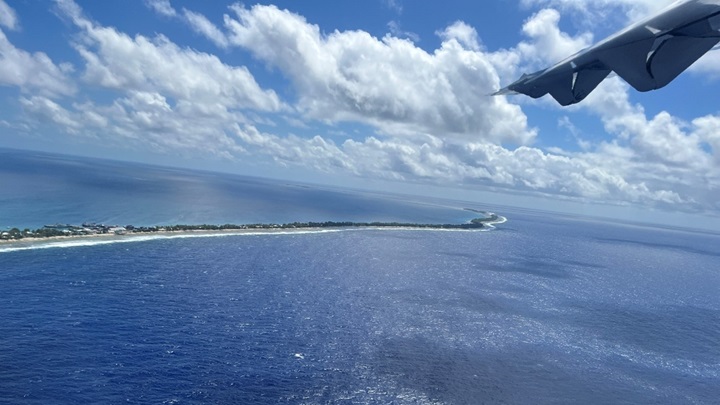
Fongafale Island, where Tuvalu's capital Funafuti is located. As an atoll nation, its low-lying, narrow terrain is highly susceptible to coastal erosion and high waves.
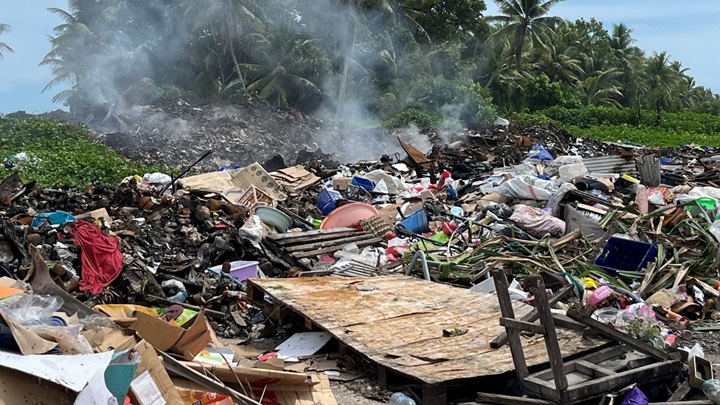
The continuously growing capital, Funafuti, also faces serious waste management problems, significantly impacting the ocean and soil.
As part of the adaptation of international cooperation policies for climate change by countries like Australia, people from developing island nations in Oceania, such as Tuvalu, are migrating to developed countries. This research project analyzes the current situation and challenges faced by these migrants, as well as by those who remain in their home countries, from an empowerment perspective. The goal is to consider the type of support required for Japan's international cooperation based on the results of this analysis.
Specifically, the people of Tuvalu have a cultural identity rooted in a life closely connected to the sea and land, utilizing their indigenous knowledge. The research focuses on the economic, social, and psychological impacts that migration has on them. Surveys have been conducted in both the accepting developed countries and the sending developing countries. This fieldwork is focused on the side of the developing countries, —in this case Tuvalu and Fiji. The survey explored the feelings of the Tuvaluan people regarding whether to migrate or not, and the potential impact that changes in community composition due to out-migration could have on the sustainability of communities whose practices are rooted in indigenous knowledge.
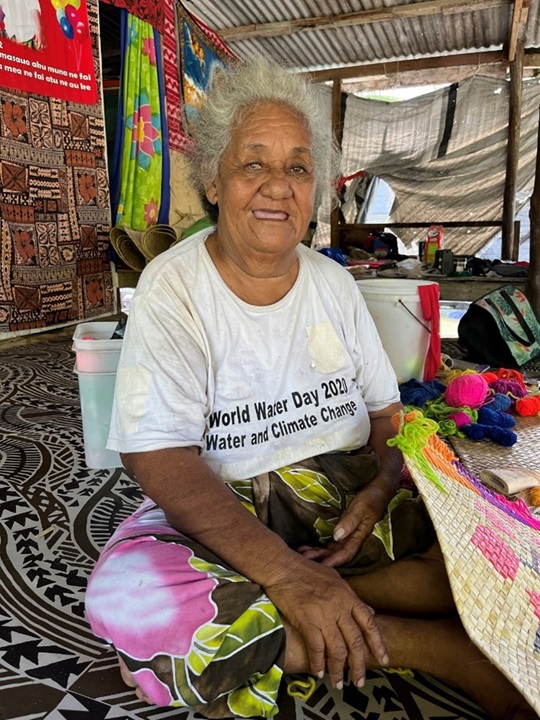
A woman making a traditional mat on Funafala Island, Funafuti Atoll. Due to the depopulation of outlying islands and the modernization of cities, very few people now possess such skills.
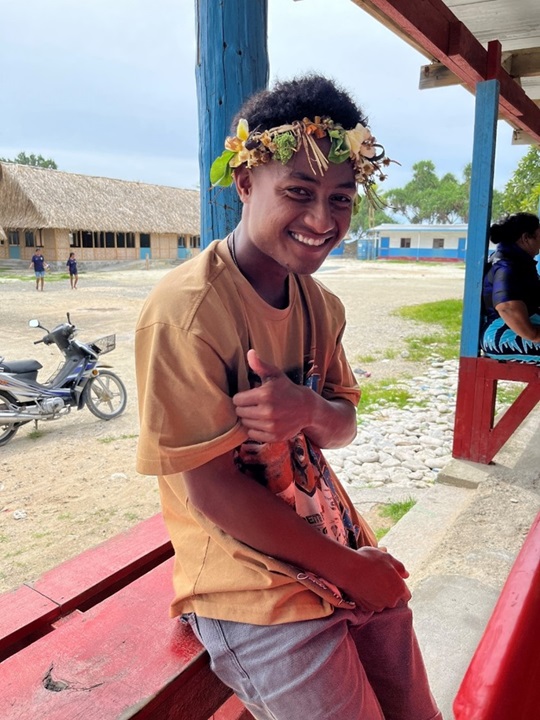
A high school student who participated in an interview. He dreams of studying nursing at a university in Fiji and then work at a hospital in Tuvalu.
During the fieldwork, Noguchi conducted qualitative data collection in both Fiji and Tuvalu, combining interviews, focus group discussions, and participant observation. In the interviews with 52 citizens, the questions addressed four key areas: (1) the impacts and experiences of climate change; (2) hopes and views on migration to developed countries; (3) connections and feelings toward their communities and the natural environment; and (4) the link between Tuvalu's social and natural environment and their lives. Additionally, interviews with nine experts from UN agencies, government, and NGOs focused on climate change and migration-related policies, the outcomes and challenges of migration policies, and their personal perspectives on migration.
In Suva, Fiji, Noguchi visited the Tuvaluan community and conducted a focus group discussion with Tuvaluan immigrants. In both Fiji and Tuvalu, she participated in various community and church events, observing NGO climate adaptation activities, community activities by local residents and their utilization of indigenous knowledge in community development.
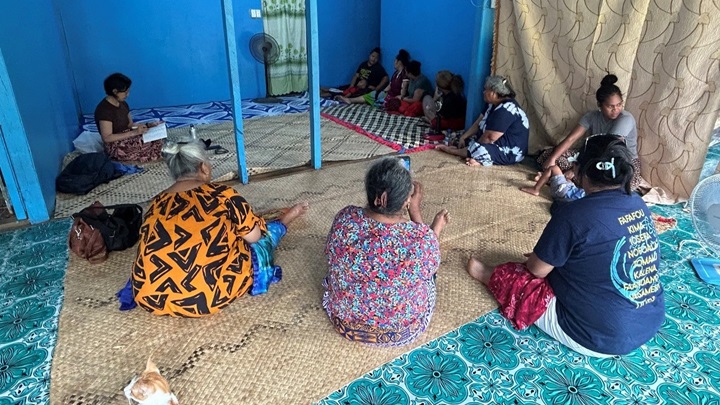
Research Fellow Noguchi Fumiko (back left) conducting a focus group discussion with nine local women in the Tuvaluan community in Fiji. In the community, second and third-generation Tuvaluans also live, and the Tuvaluan language, culture, and values are cherished.
Reflecting on the fieldwork, Noguchi stated that she was able to observe certain patterns in how Tuvaluans, both those living in the country and abroad, respond to climate migration policies—information that is difficult to obtain from previous research. She emphasized that the local sea and land environment is deeply intertwined with community and culture, forming the values and identity of Tuvaluans.
Although climate change did not emerge as a direct reason for migration, interviews revealed that all respondents had some experience with, or anxiety about climate change-related disasters and impacts. Noguchi noted that their views on migration differed depending on the respondents’ age and family role. Many respondents expressed mixed feelings: some saw migration as necessary for education or healthcare, while others hoped to return after studying abroad or preferred not to migrate at all.
Regarding those who remain in Tuvalu, she asked how people felt when seeing off those who leave the island. Some young people found it too painful to answer. Noguchi also saw that many shed tears at the airport farewells. Noguchi believes this reflects the strong, unbreakable connection of Tuvaluans to their land, sea and community, and the unspeakable complex feelings of those who are left behind.
Based on the findings of this survey, the next step will be to conduct a survey on the current situation of Tuvaluan immigrants in developed countries. This will involve asking questions about their feelings towards their home country, challenges in their new communities, and the utilization of indigenous knowledge for their participation in community development. These results will be combined with the findings from the field research in Tuvalu and Fiji to thoroughly examine the outcomes and challenges from an empowerment perspective of climate migration policies of developed countries, as well as the effects and challenges from a climate change adaptation perspective, ultimately leading to the consideration of necessary supporting measures.

事業事前評価表(地球規模課題対応国際科学技術協力(SATREPS)).国際協力機構 地球環境部 . 防災第一チーム. 1.案件名.国 名: フィリピン共和国.

事業事前評価表(地球規模課題対応国際科学技術協力(SATREPS)).国際協力機構 地球環境部 . 防災第一チーム. 1.案件名.国 名: フィリピン共和国.

事業事前評価表(地球規模課題対応国際科学技術協力(SATREPS)).国際協力機構 地球環境部 . 防災第一チーム. 1.案件名.国 名: フィリピン共和国.

事業事前評価表(地球規模課題対応国際科学技術協力(SATREPS)).国際協力機構 地球環境部 . 防災第一チーム. 1.案件名.国 名: フィリピン共和国.

事業事前評価表(地球規模課題対応国際科学技術協力(SATREPS)).国際協力機構 地球環境部 . 防災第一チーム. 1.案件名.国 名: フィリピン共和国.
scroll